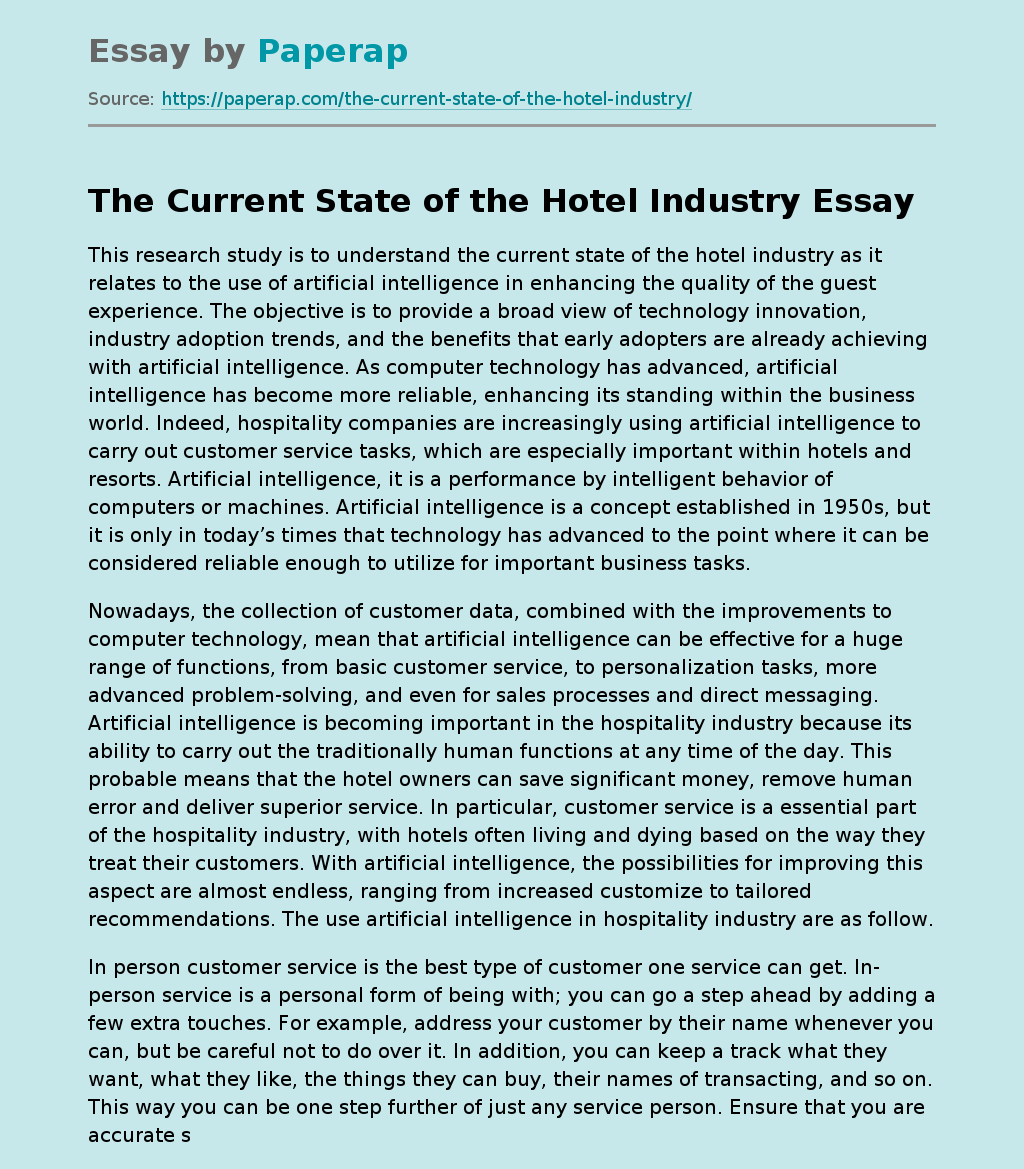The Current State of the Hotel Industry
The following example essay on “The Current State of the Hotel Industry” research study is to understand the current state of the hotel industry as it relates to the use of artificial intelligence in enhancing the quality of the guest experience. The objective is to provide a broad view of technology innovation, industry adoption trends, and the benefits that early adopters are already achieving with artificial intelligence.
As computer technology has advanced, artificial intelligence has become more reliable, enhancing its standing within the business world.
Indeed, hospitality companies are increasingly using artificial intelligence to carry out customer service tasks, which are especially important within hotels and resorts. Artificial intelligence, it is a performance by intelligent behavior of computers or machines. Artificial intelligence is a concept established in 1950s, but it is only in today’s times that technology has advanced to the point where it can be considered reliable enough to utilize for important business tasks.
Nowadays, the collection of customer data, combined with the improvements to computer technology, mean that artificial intelligence can be effective for a huge range of functions, from basic customer service, to personalization tasks, more advanced problem-solving, and even for sales processes and direct messaging.
Artificial intelligence is becoming important in the hospitality industry because its ability to carry out the traditionally human functions at any time of the day.
This probable means that the hotel owners can save significant money, remove human error and deliver superior service. In particular, customer service is a essential part of the hospitality industry, with hotels often living and dying based on the way they treat their customers.
With artificial intelligence, the possibilities for improving this aspect are almost endless, ranging from increased customize to tailored recommendations. The use artificial intelligence in hospitality industry are as follow.
In person customer service is the best type of customer one service can get. In-person service is a personal form of being with; you can go a step ahead by adding a few extra touches. For example, address your customer by their name whenever you can, but be careful not to do over it. In addition, you can keep a track what they want, what they like, the things they can buy, their names of transacting, and so on. This way you can be one step further of just any service person. Ensure that you are accurate so that the customer is treated the same way every time.
The most obvious way the artificial intelligence can be establish by those within the hospitality industry IS for front-facing customer service. In particular, the technology has been shown to be extremely effective when it comes to direct messaging and online chat services, responding to simple questions or requests. For example, the artificial intelligence chatbots have been use on social media platforms, allowing customers to ask questions and get almost instant responses, 24 hours a day, seven days a week. This is invaluable to hotels, because it provides the type of response times that are almost impossible to maintain with human-to-human interaction.
This technology can be used to quickly sort through large amounts of data and draw important conclusions about customers, or potential customers. How we can enhance the guest experience by AI: Voice-activated speaker systems, text-based personal assistants are in our homes and in our pockets. These devices book our appointments, monitor our home security, play our music, and create our shopping lists.
They tell us when the cake is ready to come out of the oven and what the weather will be like the next day. We have come to rely on these devices for our convenience. They drive efficiency in our day-to-day lives. They practically serve as an add on of our own brains. Artificial intelligence enabled devices assume a mass of different forms. Some forms are currently drawing more attention than others. Robotic butlers, concierges and luggage handlers have generated significant media buzz, more for the “surprise and delight” novelty aspect than for the actual benefits they deliver.
Over a period of time, these robotic additions to hospitality guest services teams, whether resembling Star Wars droids or lifelike humanoids, may come to play a valuable role in enhancing the guest experience. Artificial intelligence improves in performance with the addition of increasingly large volumes of data and increasingly sophisticated algorithms. It improves as it learns more and more about guests wants and needs preferences, continuously increase its knowledge base.
Artificial intelligence also improves guest service fulfill while decreasing problem resolution time by an average of one-third. Artificial intelligence is used to tackle more complex guest experience management tasks and take on any number of additional responsibilities that directly influence customer satisfaction rates. Conclusion :- When it comes to utilizing Artificial intelligence, the hotel industry was lagging behind the times.
However, that is no longer the case, particularly with respect to the guest experience. Today the industry is moving fast and furiously toward not only mirroring AI-enabled home and office experiences in guest rooms, but surpassing those experiences with a range of innovative capabilities designed to further elevate the overall guest experience across the entire property — and beyond. AI is already changing the guest experience across the hospitality lifecycle, including the on-property experience.
The Current State of the Hotel Industry. (2021, Feb 22). Retrieved from https://paperap.com/the-current-state-of-the-hotel-industry/

